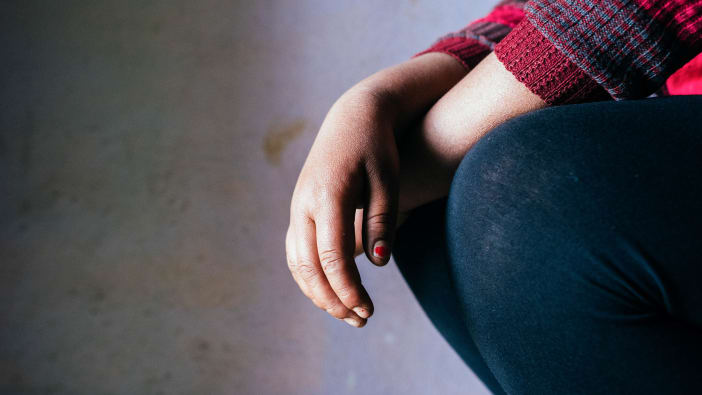It started with small steps in 2011, when the Bola na Rede (‘Ball in the Net’) campaign was dreamed up and planned. Over a period of three years individuals, networks, churches and organisations started joining together in the hope of seeing children and young people freed from the threat of abuse and sexual exploitation by tourists during the 2014 FIFA World Cup. The movement grew. By summer 2014, the campaign involved more than 300 churches, dozens of organisations and hundreds of individuals.

Articles
Mobilising cities to protect children and young people
A campaign to raise awareness of sex trafficking during the 2014 Fifa World Cup
2015 Available in English, French, Portuguese and Spanish

From: Human trafficking – Footsteps 96
Real-life examples of the lies traffickers tell and action to prevent trafficking
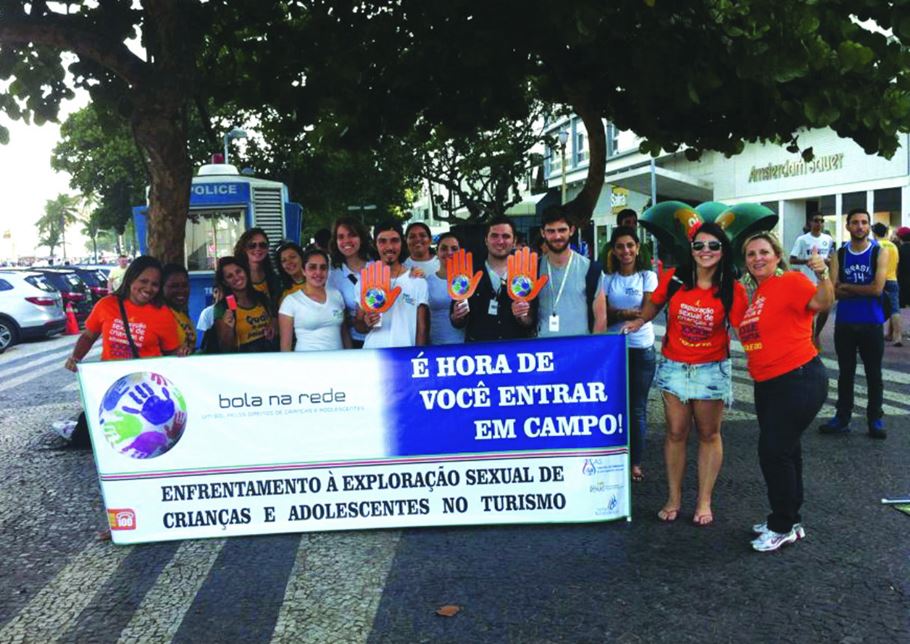
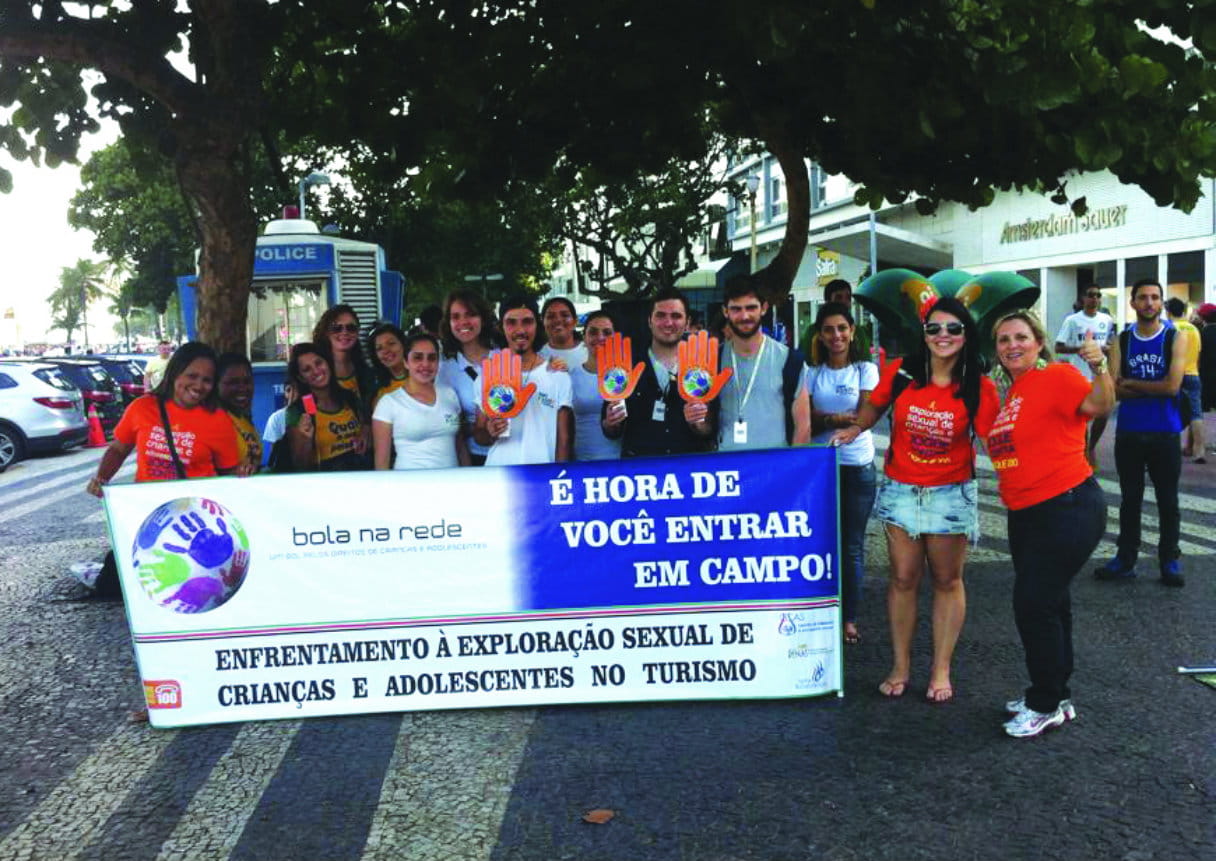
Campaigners invite people to 'take to the field' in action against the sexual exploitation of children and young people by tourists. Photo: Bola na Rede
Involving children and young people
Activities took place to prevent the abuse of children and young people by:
- welcoming and protecting children and young people
- training children and young people to understand their value and the dangers of abuse.
Welcoming spaces provided a safe environment for children and young people in 11 of the 12 host cities during the World Cup. Altogether, there were 40 welcoming spaces during the World Cup, including 25 World Cup Bible Schools. One project aimed to boost children’s self-esteem and prevent sexual exploitation by providing kits that told the story of Jesus welcoming children (Mark 10: 13-16) through a story-board and colouring sheets. Churches and organisations in the host cities distributed the kits to vulnerable children.
To educate and raise awareness, an anti-abuse workshop was held with children and young people of the municipalities of Anori, Beruri and Coari. The mayor of Coari, suspected of being ringleader of a sexual exploitation network in the city, was sent to prison some months before the World Cup, but it seemed that he still had command over the city. Even the churches were divided between those that supported the mayor and those that opposed him. In these circumstances, it was particularly important to help protect children and young people.
Targeting tourists
Teams of people who could speak another language raised awareness among tourists at airports, in metro stations, in city squares, on beaches, at FIFA’s Fan Fest, at tourist attractions and in areas known for prostitution. More than 100 awareness-raising activities took place in 16 cities across Brazil, including dramas, public prayer vigils and distribution of leaflets giving information.
Reporting incidents
In Rio de Janeiro, three tourists informed the team that they had been offered sex packages with children. The team reported the cases to the Federal Police so that they could go to the hotels, arrest the managers and fine the establishments.
Partnership with the authorities
Being invited to partner with the public authorities opened doors for the team to occupy spaces visited by tourists, such as the airport, event venues and even the Goal Walk in Porto Alegre which ran from the city centre through the public market and ended up at the Beira Rio Stadium. Having access to the Goal Walk was particularly effective on match days.
Challenges
In several cities, such as Belo Horizonte, São Paulo and Rio de Janeiro, some activities were hindered by FIFA guards who prevented activities such as the distribution of flyers, use of music and loudspeakers, dancing and any mobilisation that might ‘disturb’ the tourists. In Rio de Janeiro, an activity with 100 adults and 60 young people that was to take place on the Copacabana beachfront had its licence refused by the municipal government. However, other activities took place with smaller groups that did not need a licence.
Churches united in action and prayer
As well as the World Cup host cities, which encouraged awareness-raising and welcoming activities, several other cities expressed support for Bola na Rede. In the city of João Pessoa, the organisation LOVE Brazil contacted the Bola na Rede team, and they quickly started working together. They adopted the campaign slogan: ‘Sexual exploitation of children and young people is not tourism. It’s a crime.’
Ediomare Nóbrega, one of the coordinators, describes the activity that took place on 28 June 2014: ‘Hundreds of volunteers, from dozens of churches of different denominations, spread out at traffic lights throughout the city with a single message: “We love ‘with attitude’ and we are uniting against the abuse and sexual exploitation of our children.” All together with one voice. How amazing! How exciting!’
Bola na Rede held 16 prayer events and vigils in houses and prayer rooms across Brazil during the 30 days of the World Cup. The cities of Fortaleza and Porto Alegre provided a specific space for prayer, open 12 hours a day.
Footballers support Bola na Rede
Two footballers who understand all about Bola na Rede joined the campaign. Marcos Venâncio de Albuquerque, better known as Ceará, is right back of the Cruzeiro team and pastor of the Gethsemane Baptist Church in Belo Horizonte. Lucas Pierre dos Santos Oliveira is also a Christian and plays as midfielder of Atlético Mineiro.
Rivals only on the field, they are both members of Athletes for Christ and wear the same shirt for a higher cause: the protection of our children and young people.
This is also a victory for the Bola na Rede movement which is working on mobilising Christian athletes to join its team!
The game goes on until 2016!
We understand that sexual exploitation of children and young people is still a problem that needs to be tackled. The Brazilian church has already come onto the pitch to win this fight and we cannot waste this force! Bola na Rede is preparing to continue with some activities until 2016, when the Olympics take place in Brazil.
Mass campaign and action
Recipe for success…
- Plan activities and build networks a long time in advance
- Use many different types of approach to target different groups
- Coordinate individuals, churches and Christian organisations
- Get support from famous people
- Promote activities through the media
- Provide background resources for those working on the campaign and publicity resources for everyone.
Promoting the campaign
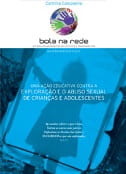
In a mass campaign with good funding, there are opportunities to produce materials of different kinds to support the campaign. Here are some examples.
Extracts from the campaign textbook
The campaign textbook explains about sexual abuse, shares examples from survivors, uses biblical verses and reflections to inspire Christians to act, and describes how people can take part in the Bola na Rede campaign.
Silence of the victim
It is fear that causes victims to remain silent.
This fear is associated with:
- PERSONAL SAFETY The aggressor says: ‘If you tell anyone, I’ll kill you’
- REPROACH FROM OTHERS The aggressor says: ‘If you tell, they’ll be disgusted with you’
- ENDING UP AWAY FROM THEIR FAMILY The aggressor says: ‘If you tell, I’ll send you away from home’
- HARMING PEOPLE THEY LOVE The aggressor says: ‘If you tell, I’ll abuse your sister’
- NO-ONE WILL BELIEVE THE STORY OF ABUSE The aggressor says: ‘No-one’s going to believe you’
What you can do
- Try to raise awareness about the existence of the phenomenon by distributing leaflets, giving talks, etc.
- Write to your political representatives and press for the creation of an international agreement that provides for the deportation, with no right of return to Brazil, of foreigners who commit sexual crimes involving vulnerable individuals in our territory.
- Encourage the tourism companies in your city to post on their own websites and include in their advertising materials information that encourages a policy of protection for children and young people.
- Monitor and report any material broadcast (via radio, television, newspapers and the internet) that could encourage sexual exploitation of children and young people.
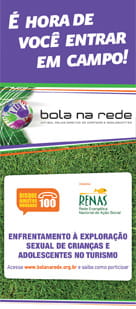
We can learn a lot from the way that Bola na Rede produced their publicity material. They used the language of football to draw people in and connect the issue of sexual exploitation to the World Cup. The organisation’s title, Bola na Rede, meaning ‘Ball in the Net’, is a good example. They often refer to ‘goals’ and say people are coming ‘onto the field’ or ‘onto the pitch’ to describe when people choose to get publicly involved in the campaign. The participating people, organisations and churches used the same materials with the same pictures and campaign phrases. The emergency phone number to ‘dial human rights’ appears prominently on leaflets, banners and other publicity material.
Article by staff at RENAS (Rede Evangélica Nacional de Ação Social – National Evangelical Network for Social Action), edited by Helen Gaw.
View or download this resource
Get this resource
Get this resource
Similarly Tagged Content
Share this resource
If you found this resource useful, please share it with others so they can benefit too.

Subscribe to Footsteps magazine
A free digital and print magazine for community development workers. Covering a diverse range of topics, it is published three times a year.
Sign up now - Subscribe to Footsteps magazine

